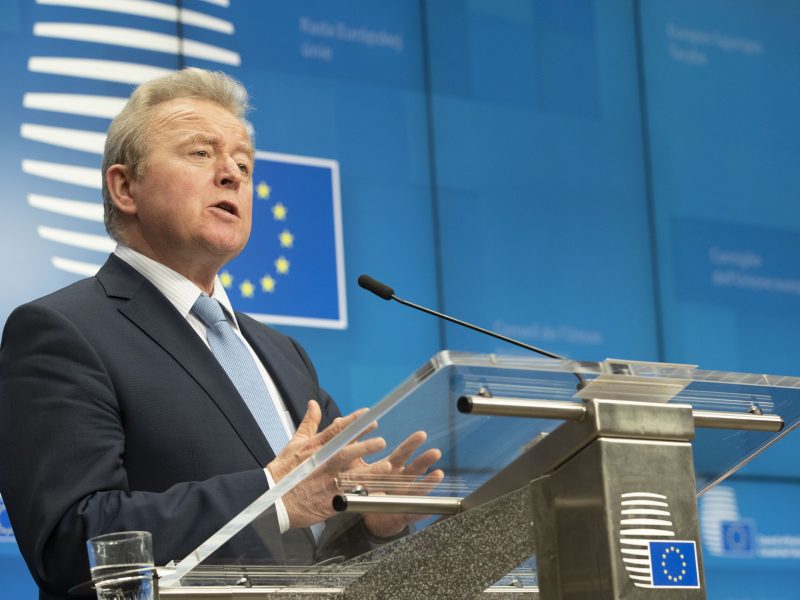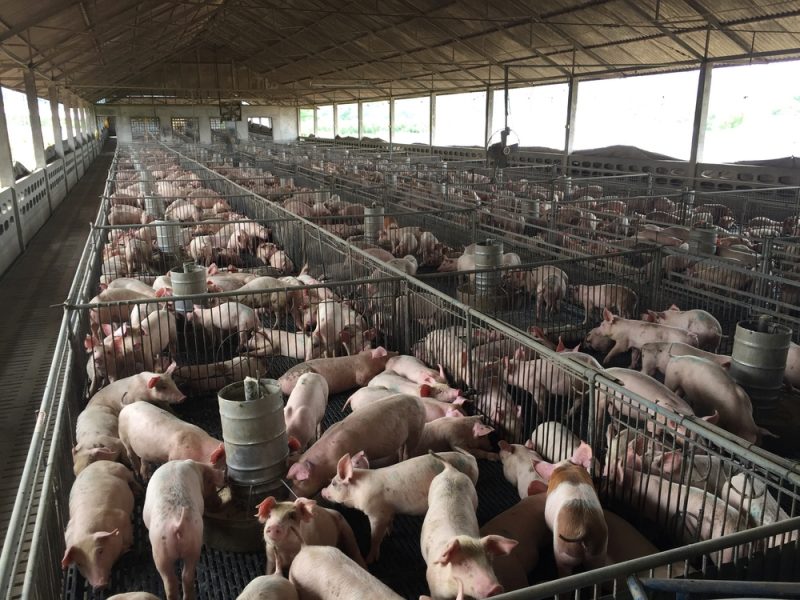The French government intends to allocate €100 million to develop the country’s plant-based protein production. The decision, however, is based on commercial rather than environmental concerns. EURACTIV France reports.
French President Emmanuel Macron has been hammering the idea of developing the country’s plant protein production for a long time. He did so at the G7 in Biarritz in August 2019, at the International Agricultural Show in Paris in January 2020 and during his televised speech on 12 March this year.
A strategy to reduce French imports of vegetable proteins is finally on the table with €100 million of the country’s recovery plan being allocated to the production of plant-based proteins.
This amount should make it possible “to build our food sovereignty” by “sharply reducing the import of proteins intended for animal husbandry”, according to a government press release.
European production weakened
Rapeseed, soya, sunflower, beans, legumes: livestock farmers use many vegetable proteins to feed their animals and ensure their yields.
The EU imports close to 17 million tonnes of crude protein each year, according to the European Commission’s 2018 report on the development of the bloc’s plant proteins in the EU. Of these imports, 13 million are soya-based, the protein content of which makes it an essential feed for pig, cattle and poultry farms.
Although France is one of the European countries that produce the most oilseeds – particularly rapeseed and sunflower – its independence is far from assured.
In 2018, France imported three million tonnes of soyabean cake. And although about 400,000 tonnes of soybeans were grown in France, nearly 600,000 tonnes were imported from Brazil, the US and Argentina in particular.
French farmers are finding it hard to compete with prices and genetically modified seeds capable of resisting the strongest insecticides coming from American countries.
“Argentinean soya beans, Canadian and Indian lentils and American soya meal are far from meeting European specifications,” said Jean-René Menier, a farmer from Morbihan and an elected member of the French Federation of Oilseed and Protein Producers.
“In France, we can’t afford to sell off our crops when we already follow extremely strict production rules,” he added.
Surge of national sovereignty
Developing a European culture of plant-based proteins is not short of advantages such as potentially increasing national sovereignty, protecting the environment and health. But such an undertaking is mammoth and Europe continues to lag far behind.
Besides, Europe’s dependence on American imports is historical, rooted in long years of trade negotiations.
After the Second World War and before the World Trade Organisation was set up, American countries agreed to specialise in the production of plant proteins, while Europeans focused on cereal crops as part of GATT negotiations on customs tariffs and trade.
Although rapeseed and sunflower cultivation gradually developed in the 1970s, Europe is still bound hand and foot to the American giants.
The gap widened even further under the 1992 Blair House agreements, when it was agreed that European land devoted to soya, rapeseed and sunflower would be capped at 5.1 million hectares, which is well below the needs of the continent.
Far from a green revolution
A global pandemic later, European states became aware of the risks posed by the dependence on foreign imports. At the informal council of agriculture ministers on 1 September, French Agriculture Minister Julien Denormandie focused on the need for “European food sovereignty”, which must involve “securing supplies and developing the strategic autonomy of sectors such as vegetable proteins.”
Pending a European strategy, the French vegetable protein plan was well received.
“We are delighted, because we have been waiting for it for a long time,” recalled Menier, who proposed to establish contractual elements linking the farmers of the plains of central France to the Breton breeders. “They produce and we buy. Everyone would welcome it,” he said.
The development of a national and GMO-free production of plant proteins could relieve farmers who combine economic difficulties with environmental challenges. But Samuel Duglas, a cattle breeder in Ille-et-Vilaine, doubts whether this truly is an environmental measure.
“Reducing our foreign imports is not a bad initiative in itself. But for whom are we going to produce these plant-based proteins in France? For intensive, soil-less livestock farming, which needs exceptional protein contents to obtain huge yields,” said Duglas.
“Reducing imports of plant-based proteins is all very well, but if it’s to encourage a production system that ruins our waters and our land, without even ensuring a decent wage for farmers, I don’t see much point,” he added.
It’s now eight years since this Breton farmer stopped buying any plant-based protein.
The farmer’s 50 hectare-wide meadow ensures his herd of 75 cattle get the protein they need for lactation. With the help of the association Adage 35, which campaigns for sustainable and autonomous agriculture, Duglas switched to organic farming in 2010, even if his “real transition” is just a switch to all-grass.
“It has totally changed my way of working. I no longer grow maize, wheat, or use pesticides. Of course, in the beginning, the transition can be scary. That’s where the Adage has been very useful. It allowed me to train and meet other farmers who were able to advise me,” he said.
This cattle farmer, who has been living about 40 kilometres from Rennes since 2007, has “succeeded” in reducing his milk production. From 10,000 litres per year, he now only supplies 5,000 litres, without any problem.
“Of course my yields have fallen, but so have my costs. I’ve even gone to one milking a day, and we are doing well on the farm, I spend more time with my family. Economically speaking, the pasture is holding its own,” said the farmer, who benefits from the advantageous prices that come with the organic label.
About the government’s plant-based protein plan, the farmer is convinced that “it’s not an environmental measure.”
“It reinforces intensive livestock farming, when everyone knows that we need to change the system. We’ll only get out of it if we get out of this logic of yields,” he added.

